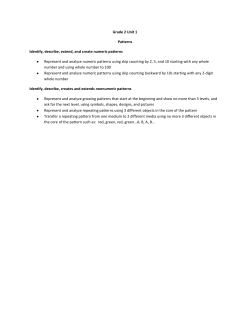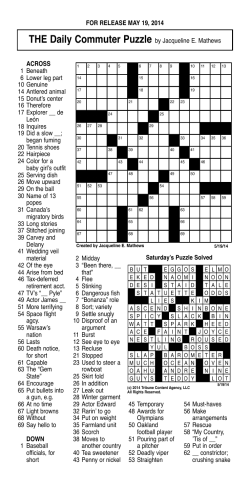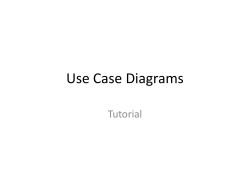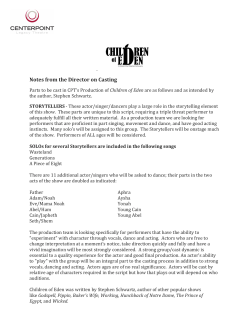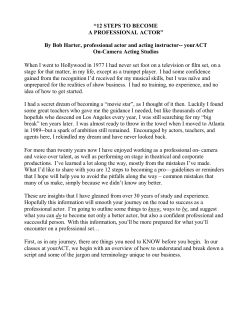
How to Avoid Writing Stupid Use Cases
How to Avoid Writing Stupid Use Cases Ian Spence [email protected] How to avoid writing stupid use cases 1. 2. 3. 4. 5. Go on holiday Spend all your time attending conferences Just start coding Write stupid declarative requirements documents instead Read use-case modeling by Kurt Bittner and Ian Spence © 2005 Ivar Jacobson International 2 Agenda • • • • Useless Cases and Useless Models Avoiding Useless Models Avoiding Useless Cases Questions and Answers © 2005 Ivar Jacobson International 3 What is a Use Case? A use case describes a sequence of actions a system performs that yields an observable result of value to a particular actor • Use cases are shown in UML diagrams • Use cases are described in text – They tell the story of the interactions between actors and the system Bank Customer © 2005 Ivar Jacobson International Withdraw Cash Use Case Specification 4 Looking Inside a Use Case • Basic Flow 1. 2. 3. 4. 5. Insert Card Validate Card Select Cash Withdrawal Select Amount Confirm Availability of Funds 6. Return Card 7. Dispense Cash © 2005 Ivar Jacobson International Alternative Flows A1 Invalid Card A2 Non-Standard Amount A3 Receipt Required A4 Insufficient Funds in ATM A5 Insufficient Funds in Acct A6 Would Cause Overdraft A7 Card Stuck A8 Cash Left Behind Etc… 5 Useful use cases • • • • • Are easy to understand Facilitate communication with the stakeholders Are shared by everyone on the project Capture the requirements of the system Support the development of the solution – Support the testing and development of the system – Support the scope management of the system – Support the planning of the project © 2005 Ivar Jacobson International 6 Useless use cases • • • • • Are either too complicated to understand or say nothing Alienate the stakeholders Are only used by the people who write them Contain no requirements Do not support the development of the solution – Cannot be used to support the testing and development of the system – Cannot be used for scope management or planning © 2005 Ivar Jacobson International 7 Useless Case #1 – No Added Value Maintain Reference Information • The use case starts when the actor selects the maintain reference date option from the menu • The actor selects the information to be maintained • The system displays the information • The actor changes the information • The system saves the changes • The use case ends © 2005 Ivar Jacobson International 8 Useless Case #2 – All Screen Design 1. The use case starts when the Customer selects the browse product catalogue menu item. The system displays the catalogue browsing window with the available products displayed in a scrolling list box. 2. The Customer selects one or more product in the list box. 3. The Customer clicks on the buy products button. 4. For each selected item the system displays a modal dialog displaying the number of items in stock and an entry field to capture the number of items required. a. The customer enters the number of items required and click the order button. The system records the items and quantity required, reserving them in inventory. 5. The system displays the payment instructions capture screen. 6. The Customer selects their method of payment from the drop-down list of credit card types. 7. The Customer selects the no marketing check box © 2005 Ivar Jacobson International 9 Useful use-case models • • • • • Are easy to understand Facilitate communication with the stakeholders Are shared by everyone on the project Provide an overview of what the system will do Describe what the system will do to provide business value © 2005 Ivar Jacobson International 10 Useless use case models • • • • • Are either too abstract or too complicated Alienate the stakeholders Are only used by the people who create them Try to design the system Describe how the system will do things © 2005 Ivar Jacobson International 11 A useful use-case model Purchase Goods Refill and Service the Machine Purchase Tickets Withdraw Cash Check the Machine is in Working Order Deposit Funds Customer Configure the Machine ATM Engineer Analyze System Performance Transfer Funds Reconcile Transaction Logs Manage Account Charge Device With Funds ATM Operator Run Advertising Campaign Update System Configuration Burglar © 2005 Ivar Jacobson International Break Into Machine Change Pricing 12 Useless Model #1 Actor 2 Actor 3 Actor 1 Just Do It User Use the System Actor 4 Actor 5 © 2005 Ivar Jacobson International 13 Useless Model #2 Business Fact F inding extends DT Making Diary appointment Reviewing your needs Fact Finding DT Updating client details uses Identifying priorities uses Adviser DT Add Prospect details Entering Client Objectives Full Financial Analysis Projection extends extends uses uses extends Protection fact finding uses extends Connecting to Head Office extends & Loans fact finding Mortgages uses uses uses uses uses Retirement fact finding extends extends Tax fact finding uses uses uses Long term care fact finding uses uses uses uses uses Issuing copy Inheritence fact finding uses Anticipated Receipts & Outgoings extends uses extends extends Calculation and Presentation F acility Designing A solution Assessing new risk Reporting suspect case Illustrate EPA extends extends Illustrate Income Withdrawal Plan extends extends extends illustrating personal pension illustrating retirement uses uses uses Illustrating Mortgage extends Surrendering Product group pension Fact findillustrating notes extends uses uses Investement, Savings and Assets fact finding Adviser Illustrating AVC uses extends Personal Fact Finding uses uses uses illustrating protection uses extends Illustrate PPA Illustrating Health Care to a group member extends Illustrate Lifestyle Plus Cash extends extends Illustrating Lifestyle Plus extends extends extends Illustrating Lifestyle uses illustrating investment extends extends uses uses uses Entering Personal Supplimental Details Entering occupational details uses uses Entering AVC details uses extends uses uses Entering Hazardous Activities extends Retired directors renumeration Entering EPA Details uses Entering Life of Another Details extends uses extends Entering APP Details Entering PPA Details extends Entering Applicant details uses Illustrating LTC Illustrating AEP extends Illustrating Maximun Ivestment Plan extends Illustrating PEP extends uses extends Illustrating Investment Bond uses Illustrating GEB Illustrating DB uses Determine suspect case status uses block fraudulent case completing retirement app extends Authorising reason for replacement extends extends uses uses uses extends extends extends Completing GP Scheme uses uses Completing Application uses extends App uses Adding new memberEntering to Entering GP PEPCash Withdrawal Plan extends uses Compiling Reason for Replacement Compiling Reason for uses Recommendationuses Entering Distribution Bond extends extends uses extends uses extends extends Personalising Reason for Recommendation Complete Declaration uses uses extends extends completing investment app extends Entering Bank account details Converting plan extends Entering Guaranteed Equity Bond extends Entering SPB App Entering Investment Bond extends uses extends uses Entering Unit Trust App Entering Entering Initial Payment RegularDetails payment details Replacing Product uses uses Entering MIP Details Entering Fund Choices uses uses Entering Assured health details uses Entering AEP App extends extends completing protection app extends Completing PPP LTC App extends Entering Lifestyle Entering App Lifestyle Plus App © 2005 Ivar Jacobson International 14 Agenda • • • • Useless Cases and Useless Models Avoiding Useless Models Avoiding Useless Cases Questions and Answers © 2005 Ivar Jacobson International 15 Focus on the System Boundary • Considering other systems as actors forces you to confront the boundary of the system you are creating Where is the information that will be required to support the behavior? Transfer Funds Bank Customer Withdraw Cash Bank System Check Balances ‘Big’ problems occur if you do not identify “your” system boundaries © 2005 Ivar Jacobson International 16 Don’t pre-empt the Design • Is the other system really an actor or part of the system’s assembly? Middleware Bank System If the system is required to communicate with another system, represent it as an actor in the model Operating System Web Browser “Use-Case Modelers must never pre-empt designers and try to use the use-case model to design the system” © 2005 Ivar Jacobson International 17 Don’t Confuse the Actors with the Devices They Use Disk Drive Keyboard System Mouse © 2005 Ivar Jacobson International 18 Don’t Confuse Use Cases with “Functions” Incorrect Use of use cases as menu options or functions: Delete Order Change Order Add Order Customer Approve Order © 2005 Ivar Jacobson International Order Inquiry 19 Don’t Confuse Use Cases with “Functions” Use cases that combine functions to reflect the real value to the actor: Browse Products and Place Orders Customer Track Orders • Take care to focus on value to the user – The communicative value of the model will soon be lost if functional decomposition creeps it. – Don’t end up drowning in hundreds of use cases © 2005 Ivar Jacobson International 20 Derive the Use Cases from the System’s Vision As with ‘actors’, All existing requirements information should be leveraged to help identify candidate Use Cases Do the use cases conform to any constraints placed upon the system? Does the system provide the behavior to satisfy the stakeholder needs and solve the problem? © 2005 Ivar Jacobson International Ot Re her P q Co uire rodu ns me ct tra nts int , s er d l o eh and k a St eeds lem t N rob en P tem a St rs, e ld er o eh hold ser k a U St take nd S s a es le yp o T R Ide Sy ntifie s d (C Feat tem ap ur ab es ilit ies ) Are all the users responsibilities sufficiently addressed by the system? Are the set of identified use cases capable of delivering all the features defined? 21 Don’t forget the Supporting and Operational Use Cases Get New and Special Offers Shopper Browse Products and Place Orders Marketer Set Product Offers Maintain Products and Availability © 2005 Ivar Jacobson International These primary use cases cannot provide their value without the information provided by the supporting use cases Product Manager 22 Handling Common Problems • Evolve the set of actors alongside the set of use cases – The two activities go hand-in-hand, simultaneously and iteratively • • • • • • • Avoid functional decomposition Maintain focus Synthesize don’t analyze Don’t describe outside the system Don’t just draw pictures Don’t mix business and system use cases Remember good use-case models have no levels – Ensure that each use case provides something of value © 2005 Ivar Jacobson International 23 Don’t Over Structure the Model. “If there is one thing that sets teams down the wrong path, it’s the misuse of the use-case relationships: include and extend” <<include>> <<extend>> “Here there be Dragons” © 2005 Ivar Jacobson International 24 A Good Model Helps to Create Good Use Cases • The key to a successful start with use cases: – – – – Understand the purpose and boundary of the system When Identifying Actors work from the specific to the general Don’t forget external systems that interact with the system being developed A use case should provide independent value to the actor, if you have to execute several use cases in a sequence to add ‘value’, you have gone wrong – Use the vision and the high level requirements it contains to validate your use case model. – Evolve the set of actors and use cases alongside each other in an iterative and incremental fashion. © 2005 Ivar Jacobson International 25 Agenda • • • • Useless Cases and Useless Models Avoiding Useless Models Avoiding Useless Cases Questions and Answers © 2005 Ivar Jacobson International 26 Write Simply, Directly and Deliberately • Write in active voice: – Direct declarative statements, “the system validates the amount entered” rather than “the amount entered should be validated by the system” • Write in present tense: – What the system does, not what it will do, “the system validates the amount entered” rather than “the system will validate the amount entered”, when will in do it? • Write in newspaper style: – Simple sentences in a top down format. From major to minor issues. © 2005 Ivar Jacobson International 27 Treat the Use-Case Like a Story “The use case starts when the actor [Actor] does [something]” …… “The [Actor] does [xxx]; then the system does [yyy] in response” …… They all lived happily ever after…. “The system does [xxx]; then the [Actor] does [yyy] in response” “The use case [xxx] ends when [yyy]…. © 2005 Ivar Jacobson International 28 Make a Conscious Decision about the Depth of Detail • Use Cases can be considered a technique for reducing risk that people might misunderstand what the system should do • The amount of detail you need is dependant on a number of factors including: Limited Detail – The level of legal / contractual / safety / regulatory requirements – The amount of domain expertise you have in the team – The need to record complex decision making – The detail required to support testing activities Lots of Detail © 2005 Ivar Jacobson International 29 Sometimes an Outline is Enough Briefly Described Discovered Bulleted Outline Detailed Description Essential Outline Fully Described Source: Use Case Modeling, Kurt Bittner & Ian Spence, Addison Wesley 2002 © 2005 Ivar Jacobson International 30 Describe what Happens when the Actors / System Interact • • You will have to describe what the system does Do not describe how the user interface or internal components collaborate to do what the system does The user selects from a drop-down list…. The system prompts the user… The card reader subsystem determines whether the PIN entered is correct… © 2005 Ivar Jacobson International The system determines that the entered PIN is correct… The user enters …… The system records the amount of money dispensed… The system pops up a dialog box…. The system displays a list box… The cash dispenser component records the amount of cash dispensed as a null terminated string in the transaction database 31 Don’t rely on Just Text • Use the appropriate visual techniques to supplement and support your use cases Class (Domain) models, help illuminate the use case by explaining complex concepts Activity Diagrams, provide a way to visualize a complex flow of events Use-Case storyboards, a series of screen shots from a prototype to depict the flow of events of the use case © 2005 Ivar Jacobson International 32 Don’t Ask People to Describe Things They Don’t Understand • Don’t force people to make up requirements • Use other techniques to support your use cases – Observation – Business Models • A picture is worth a thousand words – A prototype is an invaluable tool to describe a user interface, leaving the use case to describe what happens behind the scenes. – Great for generating user feedback – Great for presenting to stakeholders • The prototype should evolve in parallel with the use case descriptions – Great for instantiating scenarios – Can be a good basis for usability testing © 2005 Ivar Jacobson International 33 Adapt the Description to Your Intended Audience • Different Audiences need different information presented in different ways Audience = Users: © 2005 Ivar Jacobson International Audience = Designers: 34 Use the Glossary and Domain Model to Capture Definitions • Anytime you see a lengthy discussion or definition that serves mostly to explain background information, consider putting it into the glossary • Enlightened use of a glossary will simplify the use-case descriptions by allowing the use case to focus on describing behavior not terminology. • Details Matter – What is “customer information”, better define it as “Name, Address, Order History” and so on.. © 2005 Ivar Jacobson International 35 Don’t Forget There Are Other Places to Put Things The system shall… The system must… The system shall… Use Cases Supplementary Specifications ? Which one to choose? ……Balance is the key! A large amount of actor interaction (ATM / UI) = majority of requirements in use cases A small amount of actor interaction (a compiler) = majority of requirements in supplementary specification © 2005 Ivar Jacobson International 36 Start from an outline – Start from the basic flow • Good writing typically proceeds from an outline; use cases are no different: – Outlines will help clarify the purpose of the use case and help you think through each step • As you evolve the use case from the outline, focus first on the basic flow 2 1 – Evolve the alternative flows only when there is the framework of the basic flow upon which to build Basic flow, then alternates © 2005 Ivar Jacobson International 37 Don’t Write Them On Your Own • Involve other people in the creation of the use cases – Subject matter experts – Developers – Testers • Always share and walkthrough the outlines before adding more detail © 2005 Ivar Jacobson International 38 Write down the requirements • Don’t be scared of detail • A use case with no detail truly is a “useless case” • The trick is to include it without obscuring the use-case message….. © 2005 Ivar Jacobson International 39 Agenda • • • • Useless Cases and Useless Models Avoiding Useless Models Avoiding Useless Cases Questions and Answers © 2005 Ivar Jacobson International 40 The End [email protected] © 2005 Ivar Jacobson International 41
© Copyright 2026

